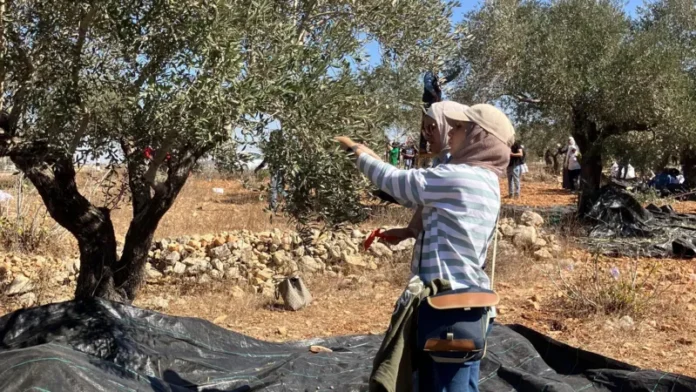West Bank, Palestine – The olive tree, an enduring symbol of Palestinian heritage and economic survival, is facing a harrowing challenge as violent attacks and restrictions increasingly disrupt the harvest season in the occupied West Bank.
For generations, Palestinian families have tended their olive groves, harvesting not just fruit but a deep connection to their ancestral lands. Today, this vital tradition is under siege.
On a quiet Thursday afternoon late last month, 59-year-old Hanan Abu Salameh ventured out to her family’s olive grove near Faqqua, a village in the northern West Bank. It was a ritual she had performed for decades.
Within minutes, however, she lay mortally wounded, a bullet in her chest fired by an Israeli soldier. Despite her family’s coordination with the Israel Defense Forces (IDF) to ensure safe access to their land, her son Fares and husband Hossam witnessed soldiers opening fire, forcing them to flee for cover.
Hanan’s tragic death is not an isolated incident. As the IDF promises to investigate, her grieving family remains skeptical that justice will be served.
“We have little hope for accountability,” said her husband. This fatal encounter reflects a broader pattern of violence and intimidation experienced by Palestinian farmers during the olive harvest.
Harvest Under Threat
The olive harvest is an economic lifeline for many Palestinian families, contributing over $70 million annually to the West Bank’s economy during good years.
Yet, harvesting olives has become a perilous task. According to the United Nations, farmers face frequent attacks by Israeli settlers and escalating restrictions from Israeli security forces, which block access to groves and vital roads.
Last year, more than 96,000 dunums (approximately 37 square miles) of olive groves went uncultivated due to Israeli-imposed barriers.
The violence has further intensified, with settlers deliberately destroying olive trees, burning fields, and stealing harvested crops. Many trees, which take years to reach fruit-bearing maturity, have been cut down or rendered inaccessible.
“Last year, we couldn’t even harvest our olives properly,” lamented Omar Tanatara, a farmer and council member in Umm Safa.
“The army came, threw the olives we’d gathered on the ground, and ordered us to leave. Some people were shot at, and we found trees cut down with saws.” This year, Tanatara and his neighbors hurriedly harvested what remained, uncertain of how long they could continue.
Even the presence of Israeli and international peace activists offering protective accompaniment fails to guarantee safety.
Israeli activist Zuraya Hadad was brutally attacked by a masked settler wielding a stick while assisting Palestinian farmers. “Rather than arresting my attacker, the soldiers let him go,” Hadad said from her home, where she is recovering from broken ribs.
The Economy’s “Liquid Gold”
At olive presses across the West Bank, sacks of freshly gathered olives are transformed into “liquid gold,” a cherished product central to Palestinian culture and livelihood.
However, the ongoing violence has severely impacted yields. Factory owner Abd al-Rahman Khalifa described the dire situation: “Income was down last year, and this year is even worse. Farmers are being prevented from accessing their trees due to settler attacks.”
Khalifa recounted the ordeal of his brother-in-law, who was attacked and had his arms broken while attempting to harvest olives near an Israeli settlement. “Our economy depends on the olive tree,” he said. “Without it, many families have nothing.”
The olive harvest is not merely an economic activity—it is a cultural and historical bond for Palestinians. The trees, often centuries old, are deeply rooted in the collective identity of Palestinian villages. Yet, as settler violence increases and access diminishes, this link is under unprecedented threat.
Settler Expansion and Government Backing
The violence surrounding the olive harvest cannot be separated from the broader political context. Over the past year, extremist Israeli settlers have been emboldened by the support of far-right Israeli ministers like National Security Minister Itamar Ben-Gvir.
Known for his hardline views, Ben-Gvir has distributed firearms to settlers and has openly supported actions disrupting Palestinian agricultural activities.
On a hill overlooking the olive groves of Umm Safa stands an illegal settler outpost led by Zvi Bar Yosef, an extremist sanctioned by Western governments for repeated violence against Palestinians. Bar Yosef’s actions are emblematic of the growing aggression settlers display under perceived impunity.
The settler movement justifies its actions with claims of divine entitlement to the land. Meanwhile, Palestinian farmers face an existential battle to retain access to their fields, which are central not only to their economy but to their cultural and familial identity.
A Fragile Future
As the olive harvest continues amid turmoil, the resilience of Palestinian farmers is both inspiring and heartbreaking. Many risk injury and death to tend their groves, a testament to their enduring connection to the land. Yet the situation grows increasingly untenable.
International organizations and human rights advocates have called for urgent intervention to protect Palestinian farmers and hold perpetrators of violence accountable.
However, without significant changes on the ground, the future of the olive harvest—and the livelihoods of thousands of Palestinian families—remains in jeopardy.
At the olive press in Umm Safa, farmers patiently wait for their harvest to be processed. For now, they cling to their traditions and the hope that the olive tree, a symbol of peace and endurance, will continue to thrive in a land scarred by conflict.

